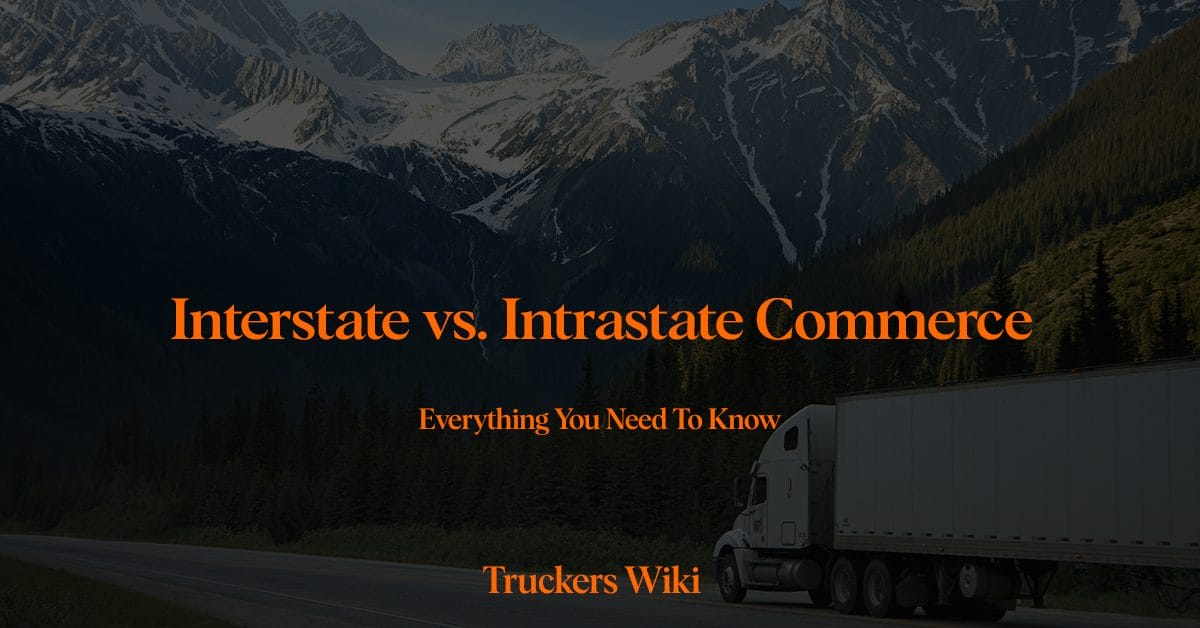
Table of Contents
Interstate vs. Intrastate Trucking the Difference
Interstate trucking involves transporting freight or passengers across state lines, while intrastate trucking is limited to moving freight or passengers within the borders of a single state.
What is Interstate Trucking?
Interstate trucking refers to the transportation of goods across state lines. This includes any trip that originates in one state and ends in another, as well as trips that may start and finish in the same state but cross another state (or country) at any point along the route. Interstate trucking is regulated by the federal government, specifically the Federal Motor Carrier Safety Administration (FMCSA), which imposes rules on safety, driver hours, vehicle weight, and emissions, among others.
Key Points:
- Involves transportation across state lines.
- Regulated by federal authorities (FMCSA).
- Subject to federal laws and regulations.
What is Intrastate Trucking?
In contrast, intrastate trucking involves the transportation of goods within a single state’s borders. If a truck’s journey starts and ends in the same state without crossing into another state or country, it’s considered intrastate. These operations are primarily regulated by the state’s own transportation department or equivalent regulatory body, which means that the rules can vary significantly from one state to another.
Key Points:
- Transportation occurs within one state.
- Regulated by state authorities.
- Regulations can vary significantly by state.
Key Differences and Compliance
The primary difference between interstate trucking and intrastate trucking lies in the geographical scope of operations and the resulting regulatory oversight. Interstate commerce requires adherence to federal regulations, including obtaining a DOT number and possibly an MC number for motor carriers. Intrastate commerce, while subject to state regulations, may have different requirements based on the specific state’s laws.
Regulatory Oversight
The most significant difference comes down to who governs the operations. Interstate trucking falls under federal jurisdiction, while intrastate trucking is subject to state laws and regulations.
Licensing and Permits
Interstate drivers must adhere to federal licensing standards, including obtaining a Commercial Driver’s License (CDL) with appropriate endorsements. Intrastate drivers also need a CDL, but the specific requirements and exemptions can vary by state.
Hours of Service (HOS)
While both types of trucking must follow HOS regulations to ensure drivers have enough rest, the specifics can differ. Interstate drivers follow federal HOS rules, whereas intrastate drivers must adhere to the state’s HOS regulations, which might offer different exemptions or rules.
Learn about HOS rules here.
Age Requirements
Interstate truck drivers are required to be at least 21 years old to operate a commercial motor vehicle across state lines. However, for intrastate trucking, some states allow drivers as young as 18 to obtain a CDL and operate within the state.
Learn about K Restriction – Intrastate only here.
Compliance Challenges
Misunderstanding or misclassifying the type of commerce in which a company operates can lead to significant legal and financial repercussions, including fines and out-of-service orders. For example, a carrier registered for intrastate commerce engaging in activities that qualify as interstate commerce without the proper authorization violates FMCSA regulations.
Operational Implications
Interstate carriers must comply with FMCSA’s Federal Motor Carrier Safety Regulations (FMCSRs), while intrastate carriers might follow a state’s adaptation of these regulations or a completely different set of rules. Approximately 40 states have adopted FMCSRs for their intrastate regulations, but variations exist. It’s essential for carriers to consult with compliance specialists or state authorities to ensure their operations align with applicable legal standards.
Learn about the Motor Carrier Authority here.
External Links
Interstate vs. Intrastate Commerce Who is the
Last modified: February 28, 2024

